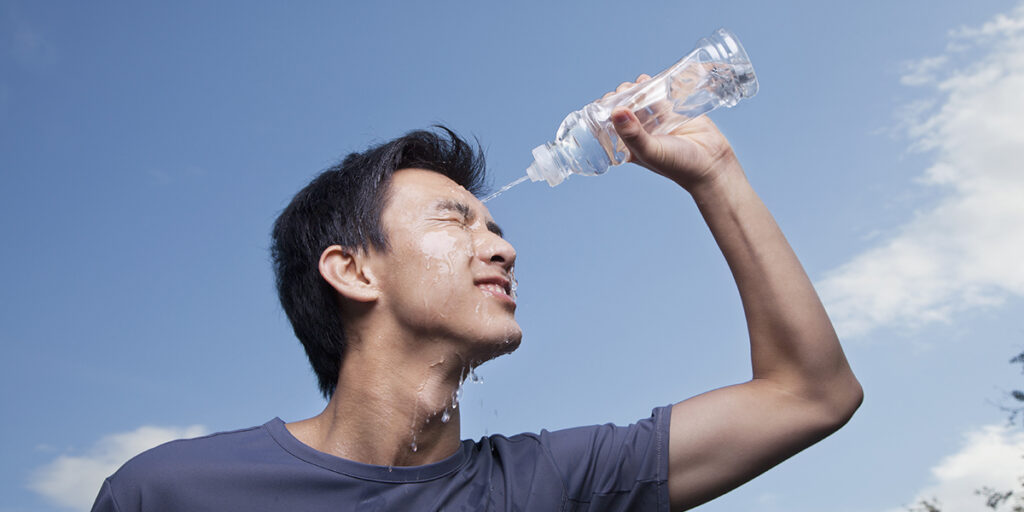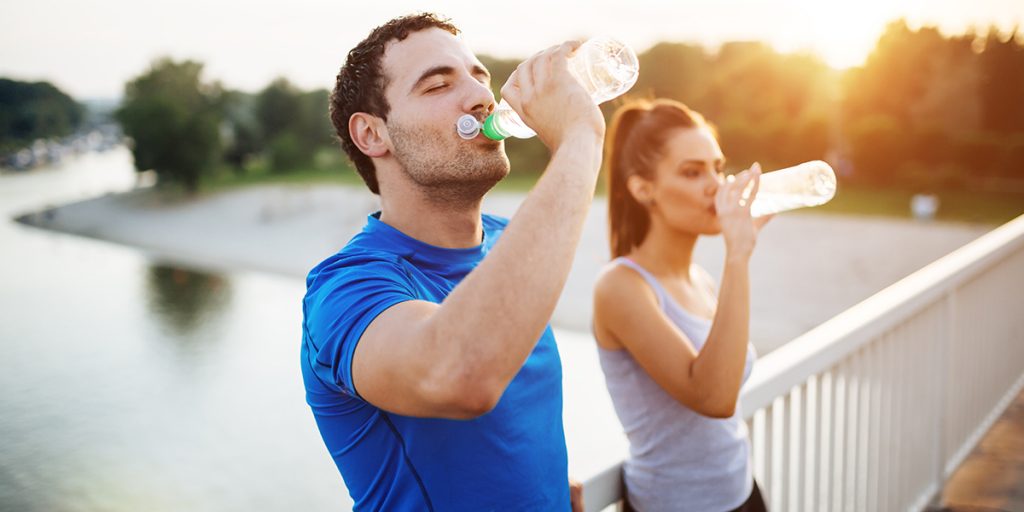Heatstroke, sometimes called sunstroke, is a life-threatening condition that usually results from prolonged exposure to high temperatures, and/or over-exertion in hot weather. Often accompanying—or resulting from—dehydration, heatstroke signals the failure of the body’s ability to control its temperature, allowing its core to reach 40 degrees Celcius (104 degrees Fahrenheit) or higher. The medical term for heatstroke is hyperthermia.
A person with heatstroke requires immediate emergency treatment as, untreated, the extreme body heat can quickly damage the brain, heart, kidneys and muscles. Existing asthma, emphysema, and other lung conditions can also be worsened by heat. The damage intensifies the longer medical treatment is delayed, increasing the risk of serious complications or death.
Symptoms of Heatstroke
Symptoms of heatstroke include the following:
- A throbbing headache
- Fainting
- Dizziness, light-headedness
- Nausea, vomiting
- Flushed skin
- Inability to sweat, despite the heat
- Rapid breathing, often shallow
- Racing heart rate
- Muscle weakness and/or cramps
- Confusion, slurred speech, agitation, seizures, staggering, or coma
Act Fast
If you suspect someone has heatstroke (or you are experiencing any of these symptoms and are alone), you must act fast, as a delay could be fatal. Immediately call 911 or drive the person to a hospital if one is close by. While waiting, carry or steer the person to a cooler area, under a tree if outdoors, or into a cooler building. Remove unnecessary clothing and cool the body any way you can, using cold compresses (for example a towel dipped in seawater). If you have access to a house where there is a shower or bath, or a garden hose if unable to gain access, run cold water over the person or fill the tub with cold water and immerse them. If available, place ice packs or cold, wet towels on the person’s head, neck, back, armpits and groin. (These areas have many superficial blood vessels which will help to cool the body.) Never use ice packs to cool a child, senior, or person with an existing medical condition unless advised to do so by a medical professional. It is vital that you attempt to cool a person suffering from heatstroke any way you can until medical help arrives.
Causes & Risk Factors
Although heatstroke is usually caused by prolonged exposure to high temperatures, or over-exertion in hot weather, certain behaviours can increase risk. These include failure to wear appropriate clothing (light clothing that covers the shoulders and a wide-brimmed hat), consuming alcohol, and not drinking enough water to replenish that lost through sweating.
People at greater risk of developing heatstroke include babies and young children, and elderly people. Babies and young children have an underdeveloped central nervous system (CNS) and the elderly often experience deterioration of the CNS—making it difficult for both groups to adapt to extremes of temperature. Elderly people who live in hot apartments without air conditioning are at high risk for heatstroke.
While most people recognize that babies, children and animals should never be left in a car (even for a brief period with the windows cracked), sometimes the temptation proves greater than common sense. Never, ever leave a person or animal locked in a car in warm weather. The temperature in a car can rise 7 degrees C (over 20 degrees F) in just ten minutes.
Certain medications can also increase a person’s risk for heatstroke. These include diuretics, which cause water to be lost from the body; vasocontrictors, which narrow the blood vessels; beta blockers, which regulate blood pressure by blocking adrenalin; and tranquillizers or anticonvulsives, which may inhibit the perception of there being anything amiss.
Finally, be sure to drink lots of water and take regular breaks in the shade if you are engaged in physical activity during hot weather.
Dehydration
Close to three-quarters of the human body consists of water. For the average adult, this amounts to 40 litres. Every day, we breathe and sweat close to three litres of this water away, and lose another 1.5 litres to urination.
Many of us spend much of the time in a state of mild dehydration due to consuming too many diuretic drinks like colas, tea and coffee. Although this has the effect of slowing us down, in hot weather, water loss through sweating is accelerated, resulting in severe dehydration. This is a serious condition that requires medical attention.
Within the body, water serves a number of important functions including facilitating the function of body cells, supporting digestion and excretion, the circulation of blood and lymph, and maintenance of body temperature. Without adequate water, vital body functions shut down, which is why people can live a lot longer without food than without water.
Symptoms of Dehydration
Signs of being dehydrated include the following:
- Nausea and weakness
- Dizziness and confusion
- Headache and/or leg cramps
- Increased heart rate, palpitations
- Reduced urinary output, bright yellow urine
- Dry mouth and tongue
Immediate medical attention is required if you, or another person, are experiencing a fever over 39 degrees C (103 degrees F); have difficulty breathing; are fainting or having seizures; have chest or abdominal pain, or have had little or no urinary output in the past 12 hours.
Ensuring you drink enough water throughout the day is very important, particularly during warmer weather, and always before and during physical activity. Remember that alcohol accelerates dehydration, and drink two glasses of water for every alcoholic beverage consumed.
As with heatstroke, seniors and children are more likely to become dehydrated as they may not experience the sensation of thirst as obviously as younger adults. This is particularly true if they have diarrhea and/or are vomiting.
The solution for mild to moderate dehydration is to drink more water, and/or an electrolyte formula such as Hydralyte®.(Water alone will not replace the electrolytes lost through sweat.) Juice is not a good idea when diarrhea is present as it can worsen the condition.




